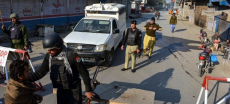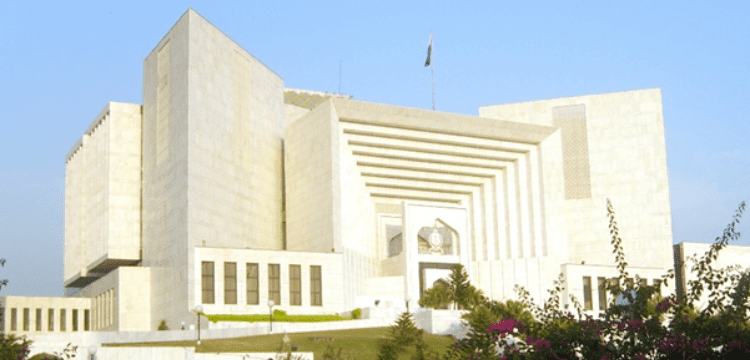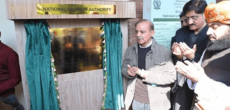[vc_row][vc_column][vc_column_text dp_text_size=”size-4″]Judge rules that the most recent changes to the accountability law do not violate fundamental rights
ISLAMABAD: On Monday, the Supreme Court requested information from the Pakistan Tehreek-e-Insaf (PTI) regarding its stance on whether exempting the armed forces from the reach of the accountability law was a democratic move and how quitting parliament after winning an election and using street power to make decisions served democracy.[/vc_column_text][/vc_column][/vc_row][vc_row][vc_column][rs_space lg_device=”30″ md_device=”” sm_device=”” xs_device=””][vc_column_text dp_text_size=”size-4″]The PTI’s case against the most recent changes to the National Accountability Ordinance was considered by a three-member special bench of the Supreme Court, which was led by Chief Justice Umar Ata Bandial and included Justices Mansoor Ali Shah and Ijazul Ahsan (NAO).
The judge questioned Khawaja Haris, the petitioner Imran Khan’s attorney, during the hearing regarding the legality of keeping the military outside the purview of the National Accountability Bureau (NAB) and the justifications for doing so.
Justice Shah stated while seated on the bench that even judges were subject to NAB law. The judge further questioned how the democratic system would function if a parliamentarian left parliament and made decisions in the open while referring to a claim made by Haris that a parliamentarian held the public’s trust.[/vc_column_text][rs_space lg_device=”30″ md_device=”” sm_device=”” xs_device=””][vc_column_text dp_text_size=”size-4″]Haris continued by claiming that the Supreme Court has resolved the remaining issues in the army chief’s extension petition. Additionally, he made mention of the Asfandyar Wali case, in which the Supreme Court deemed changes to be void. According to Justice Shah, the Asfandyar Wali case involved a law that was invalidated by the court for violating human rights. He continued by saying that the petitioner in the current instance sought to incorporate any gaps in the legislation. Additionally, he stated that the most recent modifications did not violate fundamental rights.
Justice Ahsan, who is a member of the bench, stated that the NAB amendments’ sections that were eliminated rendered the law unenforceable. He continued by saying that the court in this instance had been asked to reinstate the NAB law in its original form.
The chief justice observed that the NAB law has numerous gaps. According to the legislation, a person could be detained for 90 days on a single accusation, he added. He continued, nevertheless, that the most recent NAB modifications did not represent a legal advance either.[/vc_column_text][rs_space lg_device=”30″ md_device=”” sm_device=”” xs_device=””][vc_column_text dp_text_size=”size-4″]According to Khawaja Haris, he opposes arrests made while criminal cases, including NAB charges, are being investigated. He did note, though, that without someone to carry it out, even the best rule would be useless.
The attorney made it clear that he did not wish to annul all of the NAB modifications. He emphasised the significance of remembering the purpose of the legislature. Justice Shah said that in order to do that, the court would need to go through the parliamentary discussion on the amendments.
Haris said that there was no discussion on the amendments when the law was passed. Justice Shah told the lawyer that the government lawyer took the stand that the NAB amendments were made in light of the decisions of the Supreme Court. Haris said that the amendments were not made on the basis of court verdicts.[/vc_column_text][vc_column_text dp_text_size=”size-4″]Justice Shah also asked the PTI lawyer whether the public was also against NAB amendments, or it was up to the court to determine by itself that the people were being affected by the NAB amendments. The chief justice referred to the Darshan Masih case in which the public approached the court.
Has the public approached the court in the NAB amendment case, the chief justice asked. Haris replied that in the Darshan Masih case, non-governmental organisations (NGOs) had approached the court. He expressed the desire that NGOs should be formed against corruption as well. Justice Shah said that a plea against the NAB amendments was also pending in the Islamabad High Court. He asked the lawyer to explain why the current case could not be sent to the high court. Later the bench adjourned further hearing until Tuesday (today[/vc_column_text][/vc_column][/vc_row]











